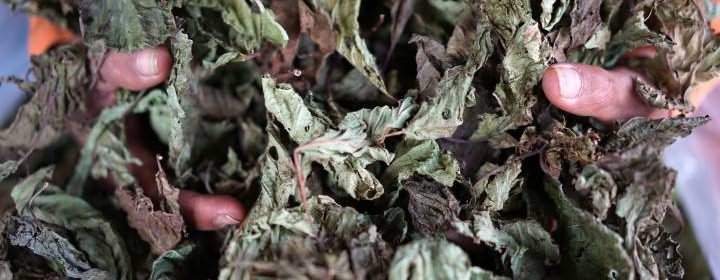What is kratom? ‘Controversial’ herbal supplement leads to overdoses in the U.S.

An herbal supplement not many know about has caused almost 100 “unintentional” overdoses in the U.S. in 2017.
According to a recent report from the Centers for Disease Control and Prevention, kratom has been linked to 91 deaths between the months of July 2016 to December 2017.
The study noted 80 per cent of the people who had kratom in their system also had other substances, including fentanyl, heroin, benzodiazepines, prescription opioids and cocaine.
Dr. James David Adams, an associate professor of pharmacology at the University of Southern California told Global News the herbal supplement is used in traditional medicine in countries like Thailand and Indonesia.
“It’s been around for a long time in those places, but here in the United States and in Canada it’s less well-known,” he said. “But people are discovering it now.”
What is it?
According to Health Canada, kratom is an herbal supplement that could “pose serious health risks when swallowed or inhaled.” Side effects of the plant product can include drowsiness, nausea, vomiting, seizures, liver toxicity and excessively rapid heartbeat.
The supplement has been linked to narcotic and stimulant-like effects, the agency noted, adding that it could have a potential for abuse. “Health Canada has not authorized the sale of any product containing kratom.”
Yet, there have been instances of kratom products in the Canadian market. In 2017, the product was seized from two stories in Edmonton and consumers who bought the products were urged to speak to their doctors.
According to Health.com, last year the U.S, Food and Drug Administration (FDA) noted some kratom vendors were falsely advertising the plant’s powers. “The FDA said the drug has been associated with treating depression, diarrhea, obesity, diabetes, stomach parasites, high blood pressure, anxiety, diverticulitis, opiate withdrawal, and alcoholism,” the site noted.
The FDA in 2018 added there has been no science or evidence that supports these medical claims.
“To date, there have been no adequate and well-controlled scientific studies involving the use of kratom as a treatment for opioid use withdrawal or other diseases in humans. Nor have there been studies on how kratom, when combined with other substances, may impact the body, its dangers, potential side effects, or interactions with other drugs.”
Looking for further research
But some still think kratom can be useful.
In 2017, University of British Columbia Okanagan assistant professor Zach Walsh co-authored a study that found kratom could be used to battle the opioid crisis.
“We certainly aren’t at the level of evidence where we can say this is going to be a substitute for opioids,” Walsh previously told Global News.
“It doesn’t appear to be anywhere near as potent in terms of being a pain reliever. But what the evidence suggests is it might be something that can help some people to get off opioids.”
But the side effects are still considered “controversial” and some reports note consumption can lead to violence, psychosis or suicide. But Walsh said this could just be hysteria.
“Hysteria similar to what we’ve seen with cannabis for 50 years. Similar to what we’ve seen with some psychedelic drugs where there’s a few instances of harms that get blown out of proportion,” Walsh said.
According to the American Kratom Association, almost five-million Americans consume kratom safely each year. The plant is sold in pills, capsules and extracts and could be used in teas or chewed, CNN reported.
“In theory, it’s supposed to help you get over your opioid addiction, but it’s actually addictive itself,” Adams said. “My perception of it is that most people are using it as an addition to their oxycodone and other drugs of abuse.”
Adams said there is research on kratom generally, but there could be more. Education and awareness is also part of this equation since many people are still safely using the plant.
“It’s been used correctly and safely for thousands of years. Provided that you follow the instructions [and] use the right dose in the right way, it’s just as safe as any other drug.”
Earlier this year, Henry Spiller, director of the Central Ohio Poison Center at Nationwide Children’s Hospital, released a statement about using kratom, CNN added.
“Individuals who choose to use kratom need to be aware of the potential risks. Just because it is currently classified as an herbal supplement does not mean that it is regulated or that it is safe,”
— with files from Kelly Hayes
Sign up for our Health IQ newsletter
© 2019 Global News, a division of Corus Entertainment Inc.
Source: Read Full Article